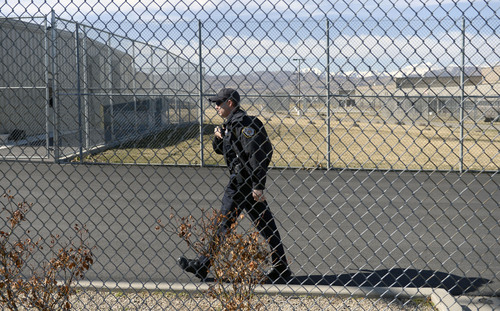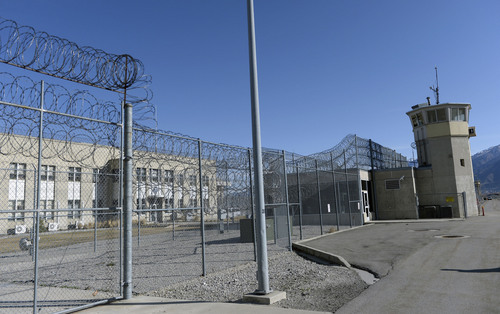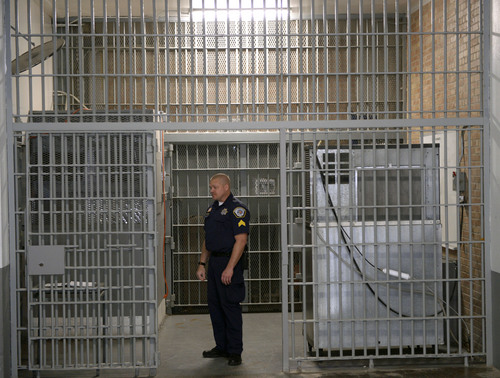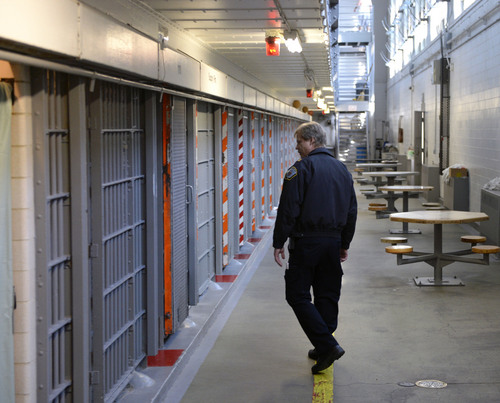This is an archived article that was published on sltrib.com in 2014, and information in the article may be outdated. It is provided only for personal research purposes and may not be reprinted.
Hours after gunshots cut through a federal courtroom Monday, killing a defendant and rattling those present, Utah prison and jail facilities across the state continued to feel aftershocks.
All took a second look at their inmates in an effort to gauge potential threats of violence or outbursts.
Some, like the Utah State Prison, instituted full lockdowns: Prisoners sealed in their cells with no one but their roommate. No mail in or out. No visitors. No volunteers. No trips to the yard.
"Locking down, especially in a situation like this, is not meant to be punitive," Department of Corrections Spokeswoman Brooke Adams said. "It's meant to ensure the safety of the prisoners and the staff in a situation that is understandably upsetting for everybody."
It's an unusual move, typically reserved for managing internal crises. But after Monday's shooting, law enforcement experts said, it may have been the right one.
About 9:25 Monday morning, the trial of 25-year-old Siale Angilau took an unexpected turn when Angilau allegedly leapt from his chair and charged at a testifying witness with a pen or pencil in hand.
Angilau, an alleged member of the Tongan Crips Gang (TCG), was stopped when a U.S. Marshal shot him several times.
The defendant was wheeled out of the courthouse on a stretcher and taken to a nearby hospital, where he later died.
Angilau's gang ties make the incident noteworthy for operators of Utah's prisons and jails, said national police practices expert Richard Lichten.
The fact that he was shot by a law enforcement officer, Lichten added, creates a potential new danger.
"There might be a feeling of retaliation against other gang members, against staff — the safest thing to do is institute a lockdown," Lichten told The Tribune. "It's very appropriate to keep a facility locked down until things calm down and [prison officials] can sort things out and determine there's no increased likelihood of violence."
Officials at Sale Lake County Jail, which had locked down about the time of the shooting for unrelated reasons, said they determined there was no threat of violence in their facility, though officers identified the six TCG members living inside the jail.
At the Utah State Prison facilities, officials ordered full lockdowns, cutting off prisoners from each other and most services inside the prison grounds.
"When you lock down a facility, you're not allowing normal activities to go on, so visitation can't happen, regular programs that would typically take place are not taking place," Adams said. "We want to be sure there's no fallout or negative reaction to what happened before we let things return to normal."
The prison in Gunnison, which houses about 1,600 male inmates, resumed "normal operation" Thursday morning, according to a news release.
In Draper, where about 4,500 male inmates live, several prison operations would remain suspended through the weekend, including any volunteer-led programs and use of the prison yard.
Visitation at both facilities will resume Friday.
"Locking a prison down is very quick," Lichten said. "It's lifting the lockdown that takes some time."
That's why lockup facilities don't do it unless they have a reason. Even then, it's more typical for a prison to lock down part of its facilities, to contain a problem, Lichten said.
Full-facility shutdowns are rare.
It's been three years since the Utah State Prison last locked down so thoroughly.
In April 2011, the facility was locked down after Jacob Eacker, a documented member of the Juggalos gang, killed his cellmate, Alfonso Lopez.
The resulting lockdown lasted about a week, Adams said.
Before that, the facility shut down temporarily following the June 2010 execution of Ronnie Lee Gardner. That, Adams said, is standard procedure around executions.
In June 2007, the facility shut down after prisoner Curtis Allgier overpowered Officer Stephen Anderson on their way to University Medical Center and shot and killed the officer.
Prison officials declined to specify how many known TCG members are housed in Utah's prison facilities today.
The witness, who was reportedly testifying about life in the TCG when Angilau allegedly charged, was identified by defense attorney Steven Killpack as 31-year-old Vaiola Mataele Tenifa.
He was uninjured in the attack, but due to continued safety concerns after Monday's incident, authorities are not disclosing his whereabouts.
mlang@sltrib.com Twitter: @Marissa_Jae









